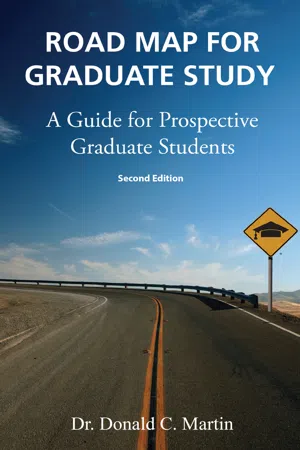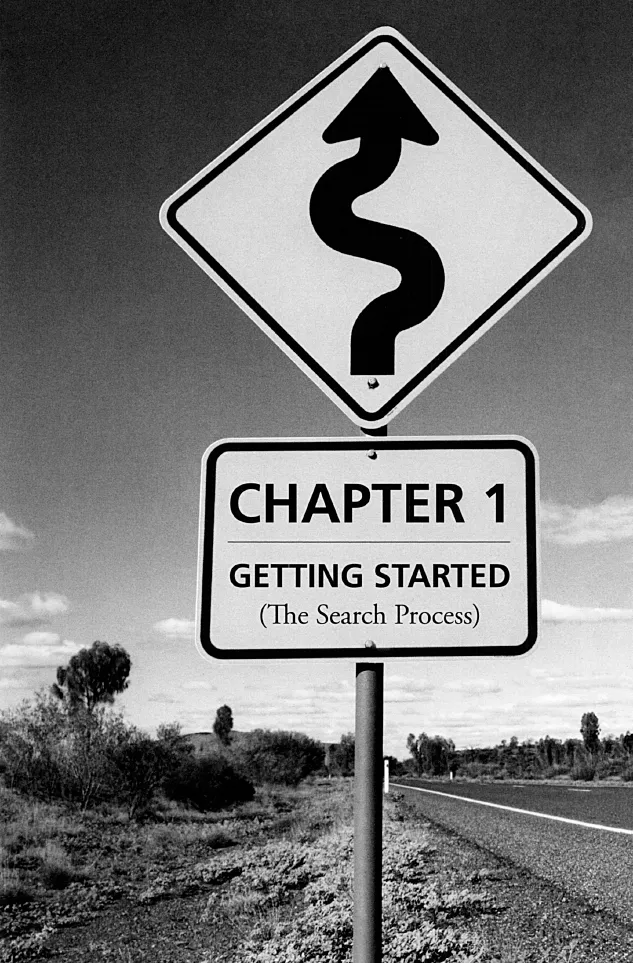![]()
CHAPTER 1
GETTING STARTED
(The Research Process)
As you begin your search for the right graduate program, the
first thing you need to do is make and take the time you need to find the institution/program that best matches your research criteria. This chapter contains two sections: 1) Seven personal questions; 2) A twelve-month check list that begins with a comprehensive list of your graduate school options and ends with the short list of those institutions/programs to which you have decided to apply.
Seven Personal Questions
At some point in your recent past you have decided to consider graduate study. You may or may not end up moving in that direction, but for now it is on your mind. Before going any further, ask yourself the following seven questions:
1. Why do you want to do this? There are many reasons.
Here are some:
❍ Truly learn more
❍ Add a credential to your resume
❍ Better chance of being promoted
❍ Credibility in your chosen field
❍ Change careers
❍ Increase your earning potential
❍ Encouragement from your family
❍ Need to feel better about yourself
❍ Do not know what else to do
❍ Something else
What are my reasons for pursuing a graduate degree?
Do my reasons make sense?
2. Why do you want to do this now?
❍ Are mentally/emotionally ready for a new challenge
❍ Employer is encouraging you to do so, and might help sponsor you
❍ Have reached a plateau in your career
❍ Are not getting any younger
❍ Logical next step professionally
❍ Are ready financially
❍ Have the necessary time to commit
❍ Something else
Why do I want to pursue a graduate degree now?
Do my reasons make sense?
3. What type of academic/professional degree are you seeking?
❍ M.A., M.S., J.D., MBA, MSW, MSJ, M.Ed., etc.,
❍ Ed.D., Ph.D., LL.M., M.D., Psy.D., etc.
❍ Joint degree
If you are seeking a degree in law, medicine, or business, you have a fairly clear idea of the type of professional graduate degree you need. However, if you are thinking about education, social services, public policy, the humanities, social sciences, etc., you may want to do a more thorough search of the type of degree earned for the field in which you are interested. For example, you may not need a Ph.D. to advance in the field of public policy; a master’s degree may be sufficient.
What type of degree am I seeking?
4. Is there a geographic region of your country or the world where you would like to study?
Perhaps you have always wanted to live in another part of your country or go abroad for graduate study. Knowing what you are thinking as to location will help guide your search. However, at this early stage be careful not to rule out a certain location completely. During the search process, you may find that an option emerges in that geographic region that may be worth a closer look.
Where would I like to study?
5. What type of learning/student experience are you looking for?
Do you prefer an environment in which faculty and students have an interactive learning approach? Are you more comfortable with lecture style? Do you enjoy a lot of social interaction with fellow students outside the classroom? Are you going to focus primarily on your coursework? Are you interested in a more research-oriented institution? Do you lean toward a public or private college/university? Are you considering an online program? A combination of classroom and on-line learning?
What type of learning/student experience do I want?
6. If a significant other/child(ren) are going to be impacted by your plans, how are you involving them in the search process?
Graduate students with partners/children have an additional responsibility/added dimension when thinking about graduate study. All are impacted by the experience. Adjustments need to be anticipated, discussed and managed. Please do not leave this important part of your planning unattended. Building a sense of consensus and excitement with all involved in the experience will reap huge dividends when the inevitable rough spots appear on the journey. To that end, it is important for you to consider the next question.
7. Should you consider a full-time, part-time or on-line program?
There are pros and cons for each of these options. Enrolling full-time means finishing more quickly, but also means a possible change in employment status and income. As for the student experience, full-time students tend to develop more of a social network, which translates into continued personal and professional relationships after graduation. Part-time students are usually juggling the demands of their studies with employment obligations. This does not allow as much time for socializing and networking. However, the benefits of employment tend to lessen the pressure of finances. Completing an on-line program allows for the most flexibility in terms of course scheduling, and may cost less. However, there will most likely be less contact with professors and fellow students, and little assistance in the career advising/placement process.
Are the significant others in my life involved in the decision-making process with me?
❍ Yes❍ No
Am I leaning toward
❍ Full-time?❍ Part-time?❍ On-line?
Finding the Right Graduate School Program
Having considered these questions, you are now ready to start gathering information about the various options available to you. Allow time for your search. Graduate school is not something to take lightly. As we have just observed, it involves a major investment personally, intellectually, socially, emotionally, and financially. Be sure to allow yourself enough time to do your “due diligence” and get all of the information you want and need. It is wise to take about a year to do your research. If you are considering starting your program of study in the fall, you will benefit by starting your search two years ahead of time. Why two years, you may ask? Typically, graduate schools start accepting applications just under a year before the intended start date. In order for you to have time to thoroughly review all of the necessary information, you will need at least a year before applying to gather that information.
Twelve Month Application Checklist
Twelve months before applying:
❍ Answer the seven personal questions posed at the beginning of this chapter.
❍ Based on the answers to those questions, conduct an initial web-based search on graduate programs for the field of study in which you are interested. For example, if you have decided on a part-time program and know where you would like to study, do a search of educational institutions that offer a part-time program in the geographic area and degree classification you desire. You can also do a search by program, such as Psychology, Law, Humanities, Advertising, Finance, etc. Conduct more than one search so as many institutions matching your search criteria as possible are found.
❍ Once you have done a thorough search, make an alphabetical list of all your options, regardless of what you presently know/have heard about them. Then create a Graduate School Spreadsheet, placing your options on the left-hand column. Be very careful about accepting word of mouth or what you think you know as final at this point in the search process. We are individuals, and as such have different needs, expectations and experiences. This is your educational experience – not someone else’s. You need to start by gathering a list of options. Do not eliminate any of them at this point. You want to get as much information as possible so you can decide what options are most appealing for you.
Remember: Perception is reality; it is where you end up, not where you begin.
❍ Once you have your spreadsheet set up, go back online and do some initial research on all the institutions you have placed on your list. Assess not only their websites, but look at the way in which content is presented. Is information easy to find? Is the tone friendly and inviting? Are there easy and quick ways to request more information? Speaking of which, this would be a good time to request written information from each institution. This will enable you to review what you receive any time you want. It will also provide you with an opportunity to find out just how responsive admissions offices are to you. This can be very telling and may shed light on the general level of responsiveness of those institutions about which you have made inquiry. Give each institution a grade on both their website and on the level of responsiveness they provide to you. Here is a suggested grading system:
Website
A = easy to navigate, informative, captivating
B = well-done, good information, friendly
C = fairly easy to navigate, not as friendly
D = difficult to navigate, not very informative
F = what were they thinking?
FF = no website, or close to nothing
Responsiveness
A = had a response within 1 business day
B = had a response within 2 business days
C = had a response within 3 business days
D = had a response within 5 business days
F = took one week or longer for a response
FF = no response
❍ Should you consider taking a graduate level course or two? Perhaps you were an undergraduate student a while ago, or you may have received your bachelor’s degree very recently. Either way, if your undergraduate GPA is not what you consider competitive, or does not speak to the academic work you believe you are capable of performing, you would do well to register at a nearby institution as a non-degree student and take one or two courses. If you do, earning an A or B will be very impressive to the admissions committee and will demonstrate that you are able to do well academically.
❍ For doctoral applicants, establishing contact with faculty is crucial. That is because unlike at the master’s level, where enrollment management staff make admission decisions, faculty are the decision makers for doctoral programs. You should identify one or two faculty members at each institution you are considering and establish contact with them. Before doing so, do thorough research on their background, research and p...

